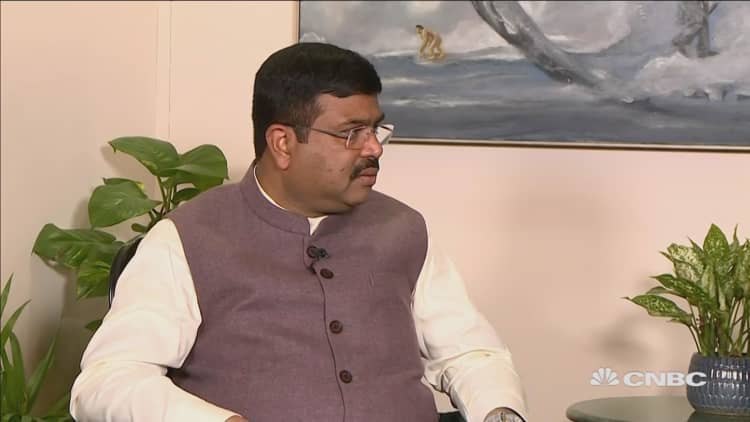Oil prices crashed this week, sparking a sharp global sell-off in capital markets — but experts say low energy prices could be a silver lining for India, one of the world's closely-watched economies.
U.S. crude and international benchmark Brent prices plunged to multi-year lows after OPEC failed last week to strike a deal on production cuts with its allies, including include Russia. That led Saudi Arabia, the world's largest oil exporter and the de facto leader of the energy cartel, to slash oil prices and threaten to ramp up production.
A supply glut has kept oil prices relatively low in recent years, as OPEC+ — made up of the Organization of the Petroleum Exporting Countries and its non-OPEC allies such as Russia — coordinated production cuts to support energy prices. The current agreement expires at the end of March, which means that starting Apr. 1, countries can pump as much oil as they want unless the producers can reach an agreement before that.
"The Indian economy is a major winner from lower world oil prices," Rajiv Biswas, Asia Pacific chief economist at IHS Markit, told CNBC, pointing out that more than 80% of India's total energy consumption in the 2018-2019 financial year was imported. He explained that falling energy prices could reduce India's inflation and lower the cost of its import bill — that could, in turn, help narrow the country's trade and current account deficits.
India lost its crown as one of the fastest-growing major economies in recent quarters, owing to a number of internal and external factors that dragged GDP expansion to below 5%. In the three months that ended in December, India expanded at 4.7%, in line with market expectations.
"A prolonged spell of low oil prices will support discretionary purchasing power," Radhika Rao, an economist at Singapore's DBS Group, told CNBC. Discretionary purchasing power refers to the amount of cash a person has available to spend after discounting their tax, debt obligation, and other expenses.
She explained that domestic oil prices could potentially become cheaper and declining margin pressures on non-oil businesses may translate into some relief for the low demand weighing on the economy.
"If accompanied by an improvement in sentiments and better confidence over income prospects, this would spell good news for growth," Rao said. "We are hopeful that an increase in government spending, positive net exports position and base effects could push up (fiscal 2021) growth."
India's fiscal year 2021 begins on Apr. 1 of this year.

Biswas added that sharply lower oil and gas costs would also help boost profitability for sectors that are intensive users of petroleum — such as petrochemicals, power generation, and transportation.
Softening of inflationary pressure on the economy could also give the Reserve Bank of India more room to cut interest rates further in an attempt to help stimulate growth and improve the flow of money in India's financial markets, he said.
Data from India's commerce ministry showed between April and December — the current fiscal year ends on Mar. 2020 — the country's import bill for oil was $95.69 billion, almost 12% lower than a year ago. It accounted for an estimated 21% of India's total imports during that period when oil prices remained above $50 a barrel.
India's Petroleum Minister Dharmendra Pradhan told CNBC last month he would be happy if crude prices were at levels between $50 and $60 a barrel.

As of Thursday afternoon in Asia, both U.S. crude and Brent prices traded under $35 a barrel.
For every dollar the price of oil drops, India saves approximately $1.5 billion, according to Akhil Bery, an analyst at political risk consultancy Eurasia Group. "However that is offset by the weaker rupee, so the benefits may not be as much as originally anticipated," he told CNBC. In the last 12 months, the rupee weakened against the greenback from levels near 70 to around 74 and oil prices are usually measured in U.S. dollars.
"It will help alleviate some of the fiscal pressures that the government has been under," Bery added.
Experts pointed that whatever benefits India may potentially get from lower oil prices could be wiped out if there is a sudden, rapid coronavirus outbreak within the country, similar to what happened in places like Italy, Iran and South Korea. As of Mar. 11, India said it has 60 confirmed cases of the COVID-19 disease.


